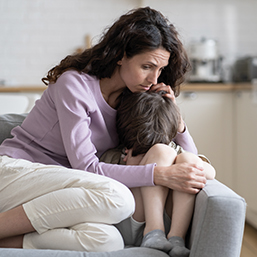
When families are restructuring, there are many important details that must be decided. Brains are working at answering questions about timelines, custody, homes, court dates, and finances. For a while, the focus on the logical may enable a numbing or postponement of the adult emotions. This is likely not true for the children; their emotions may be right at the surface.
It is impossible to predict the feelings that a child will have at any point during the separation and divorce, and for many years after. One thing we do know is that even if children do share their initial feelings, it’s normal that their reactions to and feelings about the divorce will transform as they get older and look at it in different stages of their development.
Sometimes feelings are expressed quite openly:
These hidden feelings can end up coming out as misbehaviours or big changes in behaviors (sleep, hunger, socializing, academics). Rather than just using discipline for these misbehaviours, look behind them for the feelings and support those as well.
How do we help them in the big moments?
As much as it would be amazing to wave a magic wand and wash all the hard stuff away, it just isn’t possible. Rather than trying to fix things, explore some of the following responses and decide which ones could feel right for you:
Here are some examples:
How do we help them in calmer moments?
All kids need to learn about feelings – that feelings don’t last forever, and how to let them out without hurting others. There will be many opportunities for this learning to take place throughout their lives.
Talking and teaching about feelings is often easier when we discuss characters in books or movies. We can notice patterns and facts about feelings:
When your child is calm, ask about where they feel the feelings in their bodies. Ask what tools they may want to use to get the feelings out safely. Have them create a picture or list of those strategies that you can both use to remind you about when the big feelings return.
Drawing pictures, writing, and playing with puppets can also help when it comes to letting feelings out in a safe way.
One thing to remember around all the feelings that arise during these times is that the family is going through a lot of change. Change is tricky for adults and kids. Share your belief that you and your kids can get through change because you have each other and you’ll keep working on it together, even if it is hard right now.
Author, blogger, podcast host, and parenting expert, Julie Freedman Smith has been supporting parents across North America for 20 years. Through her company JFS Parent Education, she helps parents find relief from their everyday parenting challenges. Want to know how she can help you? Email her today: This email address is being protected from spambots. You need JavaScript enabled to view it..
See our related articles:
Calgary’s Child Magazine © 2025 Calgary’s Child